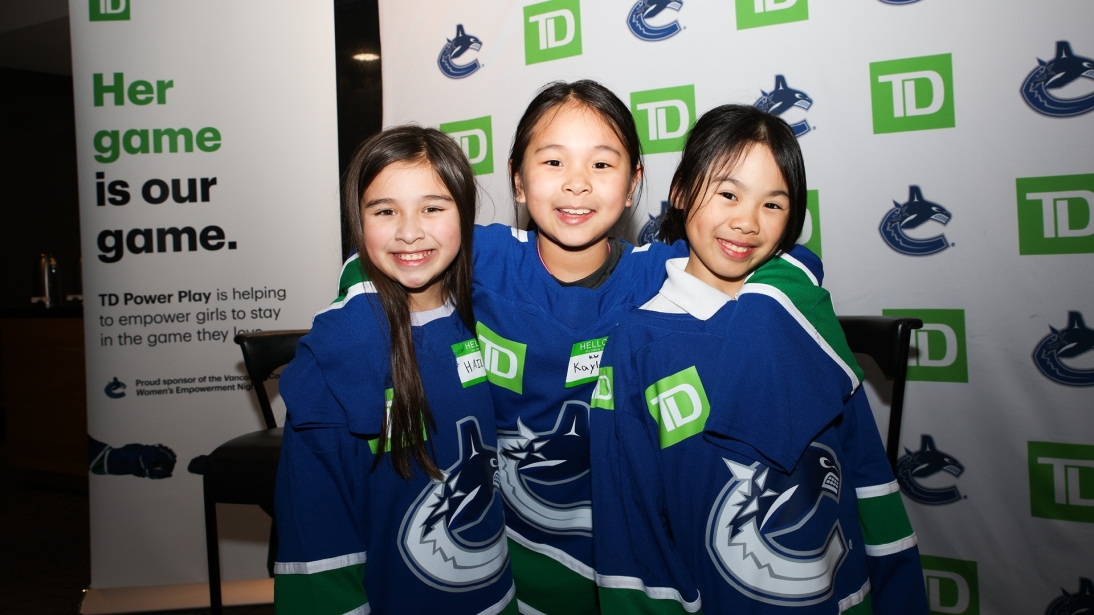Renata Fast began playing hockey at the age of eight and remembers loving the feeling of gliding on fresh ice after the Zamboni had cleaned it.
Girls' hockey was the norm for Fast growing up just outside of Toronto, she said during a TD Power Play panel at Rogers Arena in Vancouver held earlier this year together with the Vancouver Canucks.
"I didn't really know any different," said Fast, a 10-year veteran of the Canadian Women’s National Team (CANWNT) and an Alternate Captain for the Toronto Sceptres in the Professional Women’s Hockey League (PWHL).
"It never felt like there wasn't room for me."
That feeling came later, when Fast graduated from university at 22 and wanted to play professional hockey. But there was no clear path for her, even though there were opportunities for men who wanted to play past university, Fast told the panel.
She considered giving it up and getting a different job. But she stuck with it. The friendships Fast made kept her in the sport, even when she had tough moments.
"I always came back to the girls I played with," she said.
Creating a future for girls and women on the ice
While Fast stayed in hockey, other girls choose to quit the game. More than one in five girls drop out of sports in their teens, according to the Canadian Women and Sport Rally Report 2024.
When women and girls play hockey in Canada, they play for fewer years when compared to boys and men, a paper published by Hockey Canada in 2024 found.
That’s why the Vancouver Canucks and TD are working together to drive conversations about why women and girls play hockey, and what might encourage them to stay on the ice.
Fast shared her hockey experiences alongside former professional player Saroya Tinker on the TD Power Play panel at Rogers Arena in March, which also included a free all-girls hockey skills clinic led by Vancouver Canucks alumni and community coaches. TD welcomed 40 local girls between the ages of 10 and 14.
The panel unpacked why girls stop playing hockey and how they can be empowered to stay in sports and thrive – on and off the ice. Some of the tips included being open to learning, finding a supportive community, and embracing the opportunities being an athlete can create.
TD also sponsored a Canucks' Women's Empowerment Night on March 7 to celebrate the women leaders who help guide the Vancouver Canucks organization and put the spotlight on the increasing presence of girls and women in hockey and sports.
"The benefits of sports go way beyond the game itself," said Neda Hadizadeh, TD District Vice President, Fraser Valley, and the moderator of the panel featuring Fast and Tinker.
“These kinds of events are invaluable,” said Tyrrell Schmidt, Senior Vice President and Chief Marketing Officer at TD, “because they provide insight into the experiences girls and women are having in a sport, while also exploring what mentorship and leadership opportunities might come later for women athletes.”
"We hope that the impact of participating in the TD Power Play will stay with these girls long into the future," Schmidt said.
Girls hockey opens doors, on and off the ice
Tinker, a graduate of Yale University who played hockey for the Metropolitan Riveters and Toronto Six, told the panel she started playing the sport at age 7 and enjoyed all the opportunities it presented to her.
She said she remembered touring colleges and universities and getting excited about one day playing on their hockey teams.
"And now you have the PWHL to look at, too – not just playing in college but playing pro one day," said Tinker, who's the co-founder of Black Girl Hockey Club Canada and part of the PWHL's broadcasting team.
When she was younger, Tinker said she struggled with feeling like not a lot of people who looked like her were playing hockey.
"I didn’t necessarily feel like hockey was always the most welcoming space for myself, but that's exactly why I continued on to play and run Black Girl Hockey Club now. I want to make sure all you ladies have a space to play [and] a space to feel safe in," she told the panel.
Fast said her advice to girls who want to go far in hockey is to not be too hard on themselves and to be constant learners.
"Keep learning and keep making the game fun," Fast said. "Hockey's a game. It's meant to be fun."
Tinker encouraged the young hockey players attending the panel to be themselves on their hockey teams, and not be afraid to seek out teams that are more welcoming if they're feeling like they don't fit in where they are.
"Be unapologetic about who you are," she said.
